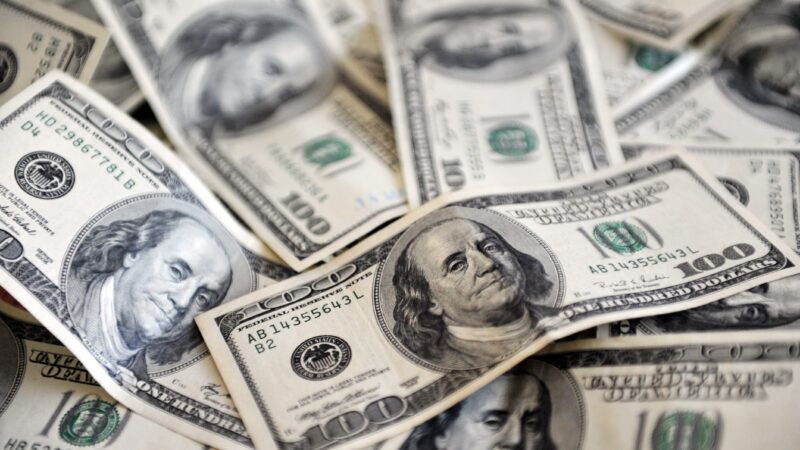State Revenue Is 'Virtually Flat.' Local Government Revenue Is Up Slightly. Congress Wants To Give Them $350 Billion Anyway.
The Democrats' COVID bill showers billions of unneeded dollars on state and local governments.

Congress is inching closer to passing a $1.9 trillion COVID bill. If it becomes law, it will shower billions of dollars on local and state governments whose revenues have been minimally affected by the pandemic.
Over the weekend, the Senate voted along party lines to approve the Democrat-backed bill, whose provisions include $350 billion in support for state, local, and tribal governments.
States will get $195 billion of that money, with each state receiving $500 million at a minimum, plus additional funds based on their numbers of unemployed workers. Local governments will get another $130 billion. Territories and tribal governments will recieve another $25 billion.
This aid comes on top of the additional transit and education funding the legislation sends to states and localities. When that's included, roughly $510 billion—a quarter of the package—will go toward state and local aid. Past pandemic relief bills have already provided state and local governments with some $310 billion, according to the Committee for a Responsible Federal Budget.
That incredible sum—which is in spitting distance of the Defense Department's budget—is gaining approval even though overall state revenues fell by only about .1 percent in 2020, according to a recent analysis by the Reason Foundation (which publishes this website). An analysis from J.P. Morgan similarly found that tax revenues were "virtually flat" for the 47 states that report their incomes on a monthly basis.
This isn't the case everywhere. Falling oil prices led to steep revenue declines in Alaska and Texas. The lack of tourism hit the Florida and Hawaii state budgets pretty hard. The fiscal year 2021, which ends in June, is also supposed to be leaner, with revenues expected to decline by about 4.4. percent.
The overall picture is nevertheless much rosier than earlier in the pandemic, when analysts were predicting state revenue declines of some $500 billion.
Indeed, an analysis from the National Taxpayers Union's Andrew Lautz has found that when accounting for states' rainy day funds and steady revenues, only about $6 to $16 billion (not the proposed $195 billion) would be needed to make those governments whole.
Lautz also argues it's inappropriate to divvy up money to states based only on their number of unemployed residents, given that the jobless are already receiving targeted benefits and that those benefits are themselves helping to prop up states' tax revenues.
"Individuals who want a job and don't have one are certainly struggling right now, but the [$900 billion] December bill and the proposed COVID-19 relief package support them with a $300 or $400 per week boost to their regular unemployment benefits," writes Lautz. "The $600-per-week benefit from the CARES Act helped prevent major state revenue dropoffs in part because it allowed unemployed people to continue spending at rates similar to before they lost their jobs."
Local tax revenues, while harder to measure given that most local governments don't report their revenues as frequently, appear to have risen year-over-year by about $60 billion during the first three quarters of 2020, according to a separate Reason Foundation analysis.
That aggregate number obscures a lot of variation between local governments. New York City saw its revenues go up during 2020, while other places like Philadelphia and Houston saw their incomes fall.
Nevertheless, a steady climb in property values during 2020, and thus the property taxes most local governments rely on, firmly in the black.
"For now, it appears that the most pessimistic revenue scenarios outlined at the beginning of the COVID-19 crisis are failing to materialize for most local governments," writes Mark Joffe, a senior policy analyst at the Reason Foundation. That suggests that the $130 billion in aid to local governments included in this most recent bill is also wildly overgenerous.
The need of recipients, however, seems to be a distant concern for the White House and Congressional Democrats backing the $1.9 trillion relief proposal. The bill is chock-full of spending that has little to do with combating the pandemic, and everything to do with rewarding liberal constituencies.
More concerning still is the seemingly muted reaction from most Americans, including many Republicans, at the price tag.
As The Washington Post's Jeff Stein noted Sunday, a much smaller $800 billion stimulus bill provoked a furious reaction from Republican voters and politicians, and criticism from more moderate Democrats. There doesn't appear to be any similar fiscally conservative backlash to the $1.9 trillion packages moving through Congress.
Having passed the Senate this weekend, the spending legislation goes to the Democrat-controlled House for approval. Proponents hope it'll pass quickly in that chamber and land on Biden's desk by the end of the week.
Rent Free is a weekly newsletter from Christian Britschgi on urbanism and the fight for less regulation, more housing, more property rights, and more freedom in America's cities.


Show Comments (96)